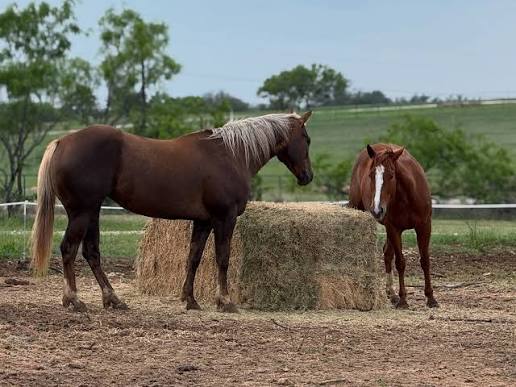New Research Changes the Way We See If Alfalfa Makes a Horse Hot

For years, horse owners have debated whether feeding alfalfa hay can make horses вАЬhot.вАЭ Some swear that alfalfa causes excessive energy and unpredictable behavior, while others claim itвАЩs one of the most nutritious¬†feeds¬†available. New research is now changing what we know about this long-held belief. In this article, weвАЩll explore the science behind alfalfa, what вАЬhotвАЭ really means in equine nutrition, and how new findings are reshaping the way owners feed their horses.
What Does вАЬHotвАЭ Mean in Horses?
When people say a horse is вАЬhot,вАЭ they typically mean the animal is more excitable, energetic, or reactive than usual. It doesnвАЩt refer to body temperature but rather to temperament or attitude. A вАЬhotвАЭ horse might spook easily, have too much go under saddle, or act nervy in situations where it would normally be calm.
The tricky part is that вАЬhotnessвАЭ is subjective. What one rider considers spirited, another might see as out of control. Nutrition, training, environment, and even genetics can influence how reactive a horse seems. The idea that a single feedвАФlike alfalfaвАФcan cause hot behavior oversimplifies a very complex equation.
The Nutritional Profile of Alfalfa
To understand where this myth comes from, we need to look at what alfalfa¬†actually provides. Alfalfa is a¬†legume¬†hay rich in protein, calcium, and energy. ItвАЩs higher in calories than grass hay and has a softer, leafier texture that horses find palatable. Its digestible energy content is what often earns it a reputation as a вАЬricherвАЭ feed.
On average, alfalfa hay contains around 16-20% crude protein and significantly more calcium than timothy or¬†orchardgrass. ItвАЩs also low in sugar and starch, which makes it an excellent choice for horses with metabolic issues.¬†The higher¬†protein and calorie content, however, can lead to misconceptions. Many assume that вАЬmore proteinвАЭ equals вАЬmore energy,вАЭ which then leads to a вАЬhotterвАЭ horse. The truth is more nuanced.
Debunking the Protein Myth
One of the biggest misunderstandings in equine nutrition is the belief that protein causes hyperactivity. Protein provides amino acids for muscle repair, hormone production, and cellular growthвАФbut it is not an energy source in the same way that carbohydrates and fats are.
When horses consume excess protein, their bodies simply convert the surplus into urea, which is excreted in urine. This process can increase water intake and urination but does not produce extra behavioral energy. So, while alfalfa is protein-rich, itвАЩs not responsible for making horses вАЬhotвАЭ in the way many¬†think.
What Science Says About Alfalfa and Horse Behavior
Recent studies have taken a closer look at whether alfalfa affects equine temperament. A 2023 review published in the Journal of Equine Veterinary Science examined several controlled trials comparing horses fed alfalfa to those on grass hay diets. The findings showed no consistent link between alfalfa intake and excitable behavior.
Instead, differences in behavior were often attributed to caloric intake. Horses receiving more total caloriesвАФregardless of the sourceвАФwere more likely to display increased energy. The key takeaway is that energy, not alfalfa specifically, is what influences behavior.
In fact, some studies suggest alfalfa can reduce stress responses. The high calcium and magnesium content may have a buffering effect on stomach acid, which helps prevent ulcers. Horses suffering from ulcers often act irritable or anxious, so a diet that improves gut comfort could actually lead to calmer behavior.
The Role of Digestive Health
Another major shift in understanding comes from research into the gut-brain axis in horses. Scientists have learned that a horseвАЩs digestive health profoundly affects its mood and behavior. Because alfalfa is an excellent source of fiber and has a higher buffering capacity, it supports gut health more effectively than some grass hays.
Horses with gastric ulcers or gut discomfort may show symptoms such as tail swishing, ear pinning, or resistance under saddleвАФbehaviors that can easily be mistaken for вАЬhotness.вАЭ In such cases, introducing alfalfa can calm the horse by soothing the digestive system. This contradicts the traditional notion that alfalfa stirs up energy.
Individual Differences Matter
Every horse is different. Breed, workload, metabolism, and environment all influence how a horse responds to its diet. For example, Thoroughbreds and Arabians tend to be more reactive by nature, regardless of what they eat. Conversely, a laid-back draft cross may remain calm even on a calorie-rich diet.
In practice, owners who notice changes after switching to alfalfa might actually be seeing a response to higher calorie intake rather than a specific ingredient. If a horse suddenly gets more energy, adjusting portion size or exercise level often resolves the issue.
The Energy Equation
So¬†if not protein, what makes a horse seem вАЬhotвАЭ? The answer lies in energy balance. When a horse consumes more calories than it burns, that excess energy¬†has to¬†go somewhere. For many horses, it translates into liveliness or fidgety behavior.
Alfalfa is more calorie-dense than most grass hays, so¬†horses¬†fedlarge amounts may have a surplus of digestible¬†energyвАФespecially if theyвАЩre in light work. This doesnвАЩt mean alfalfa itself causes excitability; it simply means the horse doesnвАЩt need that many calories. Adjusting the total ration can bring the horseвАЩs energy levels back in line.
Modern Feeding Recommendations
Equine nutritionists now recommend viewing alfalfa as part of a balanced diet rather than an all-or-nothing feed. Most horses thrive on a mix of alfalfa and grass hay, which combines the higher protein and calcium of legumes with the fiber and lower calorie content of grasses.
A general guideline is to feed alfalfa as 30-50% of the total forage for average horses. Performance horses or those needing extra weight may benefit from a higher proportion, while easy keepers might do better with less. Consulting a qualified equine nutritionist can help fine-tune the ratio to meet each horseвАЩs unique needs.
How to Introduce Alfalfa Safely
If youвАЩre adding alfalfa to your horseвАЩs diet, do so gradually over 10 to 14 days. Sudden feed changes can upset the microbial balance in the gut and cause digestive distress. Start by mixing small amounts with your existing hay and increase the proportion slowly.
Pay attention to the horseвАЩs body condition, energy level, and manure quality. If your horse begins gaining excess weight or showing signs of overexuberance, cut back slightly or increase exercise. Remember that moderation and balance are key.
Addressing Common Misconceptions
LetвАЩs tackle a few of the most common myths about alfalfa:
вАҐ¬†Myth 1: Alfalfa is only for performance horses.
While itвАЩs true that¬†alfalfa¬†provides more calories, itвАЩs also an excellent source of essential nutrients for horses of all types, including seniors and those recovering from illness.
вАҐ¬†Myth 2: Alfalfa causes kidney problems.
This stems from confusion about its high protein content. Healthy horses have no trouble processing the additionalnitrogen from protein metabolism. Increased urination is normal and not harmful.
вАҐ¬†Myth 3: Alfalfa leads to laminitis.
Alfalfa is actually low in sugar and starch, making it safer for horses prone to laminitis than many grass hays. The key is portion control and monitoring body condition.
Real-World Experiences
Many trainers and veterinarians are rethinking their stance on alfalfa based on recent findings. Performance barns often report that horses on balanced alfalfa diets maintain better muscle tone, recover faster after exercise, and stay calmer during competition.
Even leisure riders are seeing benefits. Owners of ulcer-prone or hard-keeping horses frequently notice improved appetite and attitude after incorporating moderate amounts of alfalfa. These results support what the new science suggests: alfalfa is not the¬†problemвАФitвАЩs how¬†we use it.
The Bottom Line: Does Alfalfa Make a Horse Hot?
So,¬†does alfalfa make a horse hot? The latest research says no. Alfalfa itself doesnвАЩt alter a horseвАЩs temperament or make it excitable. What can make a horse seem hot is an excess of¬†calories or underlying issues like ulcers or inadequate exercise. When used thoughtfully, alfalfa is one of the most beneficial forages available.
Instead of fearing alfalfa, horse owners should focus on total diet balance, workload, and individual response. The key is observation and adjustment. If a horse thrives on a mix that includes alfalfa, thereвАЩs no reason to change whatвАЩs working.
Modern equine nutrition has moved beyond old myths, and todayвАЩs research gives us the confidence to feed based on facts, not folklore. Alfalfa remains a valuable part of equine¬†dietsвАФnot a cause for concern.





